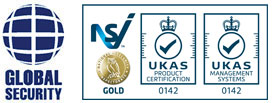Security is a high priority for most businesses in order to keep their premises safe for staff, visitors and to protect stock, equipment and sensitive information. One of the most effective security measures is provided by CCTV cameras. These provide 24 hour surveillance, and act as a deterrent to potential intruders.
Should you experience any breach of security, the CCTV footage can provide valuable evidence for police investigations. However, it’s important to understand the regulations to make sure that you are using CCTV in a lawful manner. Here’s an overview of the steps you need to take.
- General Data Protection Regulation (GDPR)
GDPR is a regulation designed to protect an individual’s privacy and personal information. This refers to any information that could be used to identify the individual, including images and car registration numbers.
Until the UK left the EU on 31 January 2020, the EU GDPR applied to UK businesses. Since leaving the EU, the UK has a separate GDPR, but the core principles remain the same. If you use CCTV, it’s necessary to register your details with the Information Commissioner’s Office (ICO) and pay a data protection fee.
There must be a legitimate reason for installing the cameras, and the CCTV should only be used for its intended purpose, which will usually be to deter and detect criminal activity. It must be used to monitor the day to day duties of staff or to record their work rates.
You are also responsible for letting people know that they are being recorded. This can be done by displaying prominent and easily readable signs to alert people to the presence of security cameras. The signs should give a reason for the surveillance and provide contact information.
Anyone can ask to see the images that have been recorded of them and this footage should be provided without charge within one month of the request.
There should be controlled and limited access to the CCTV footage, which should only be viewed by the staff directly responsible for monitoring the security system or for other authorised personnel.
The CCTV should not be retained for longer than necessary and should be securely deleted after a certain period of time. Individuals have the right to request that any images that can identify them or reveal their personal information be deleted, and it is the responsibility of the business to respond to such requests promptly.
- Domestic CCTV
The data protection laws do not apply to the use of CCTV in domestic settings for security purposes. However, it is recommended that cameras are pointed away from the neighbours’ property and shared public spaces such as paths and pavements if possible.
If you have concerns about the way a neighbour is using CCTV, it is recommended that you talk to them in the first instance, and ask them to explain their reasons for using it.
If you are looking for CCTV installation Slough, please get in touch with us today.

Leave A Comment